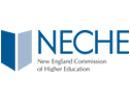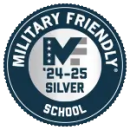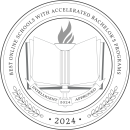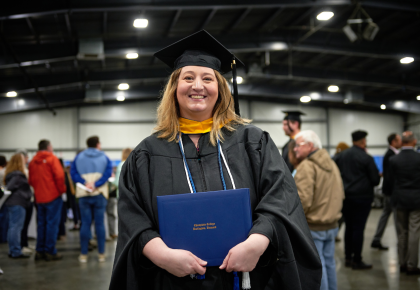CMIT-135
Empower Your Future with Information Technology Expertise
Champlain College’s online Bachelor’s in Information Technology prepares you to excel in today’s evolving tech landscape. This flexible, transfer-friendly program is designed to build critical thinking, adaptability, and technical skills across networking, programming, cybersecurity, and emerging technologies—everything you need to succeed in a fast-paced IT career.
Finish your program faster with credit for prior learning and experience.
Differentiate your degree and get your resume noticed with an added certificate. Speak with your advisor for information.
Program Highlights
- Networking and Architecture Mastery: Learn to design and implement robust networking solutions to support organizational goals, equipping you to manage complex IT infrastructures.
- Comprehensive Programming Skills: Develop and deploy software using multiple programming languages and paradigms, building versatility in software and application development.
- Cybersecurity Fundamentals: Gain hands-on experience in identifying and mitigating cybersecurity threats to safeguard information systems and organizational data.
- Web and Server Administration Proficiency: Acquire skills in web development and server management to create dynamic, data-driven websites and manage server environments.
- Innovation with Emerging Technologies: Evaluate and implement new technologies, including IoT and cloud computing, to solve real-world IT challenges.
Program Curriculum
Champlain's online information technology bachelors degree courses encompass the top skills needed by today's IT professionals. Graduates of the program are required to complete the following courses.
Professional Courses (54 credits)
General Education Courses (42 credits)
General Electives (24 credits)
Note:Some of the courses in this program are available in 15-week terms only. Please contact your advisor for details and information on how this may impact your time to completion.
This course provides students with an understanding of the many different devices and technologies, from historical to emerging, that are required to design and build networks. In a broad survey of concepts and terminology, students will learn about topology, communications, protocols, and security, and to diagram basic networks to specification.
From day one, students in this course are problem solving, first in terms of algorithmic design and then as early as week two via programming in the latest version of Python, using PyCharm. Students begin by writing a program to have a conversation, having strings and numbers as input, and advance, by week seven, to building a working password saver program, capable of looking up, adding (and encrypting), and storing passwords.
This course, through guided research and hands-on learning experiences, provides students with an understanding of operating systems, including their core fundamental principles and how they work. Students are introduced to the three most popular operating systems for personal computers (Windows, OSX and Linux), and mobile operating systems, and learn about standard functions such as memory, process/thread, input/output, storage and device management.
From storyboard to form creation, students walk through the steps to create a basic four to five-page website to specification in this course that introduces HTML5 and CSS. Hands-on assignments reinforce skills development and best practices in design: navigation, column layout, image editing and usage, fonts and tables.
Learn the basics and more in this course on Relational Database Management Systems (RDBMS) and SQL (Structured Query Language). Students propose a final project in the first module and then work, week-by-week, to design, create, and populate the database. Then, students learn to create queries and stored procedures.
Blockchain technologies used in distributed environments can improve security. In this course, students will learn blockchain basics: the structure of blockchain, the role of cryptography, consensus mechanisms and their roles, and blockchain forks types and classification. Students will also identify how blockchain technologies are currently being utilized by various industries, and be introduced to smart contracts as well as how blocks are mined.
Prerequisites
This course examines web servers from the page "in" rather than website design, which is from the page "out". Students learn the differences between TCP and UDP, gain an understanding of XML, and build a use case for a course enrollment system. Hands-on labs allow students to use ping and traceroute, and create XAMPP alias directories.
This course will introduce foundation subject matter and technologies that are critical to the multidisciplinary landscape of cybersecurity.
This introductory course to Wireless LANs focuses on the design, planning, implementation, operation, and troubleshooting of Wireless LANs. It covers a comprehensive overview of technologies, security, and design best practices with particular emphasis on hands-on skills.
Prerequisites
CMIT-130, CMIT-135
This course will introduce students to programming concepts, using a major industry programming language, C++. SDEV-240 covers the history of programming languages, the essentials of the C++ programming language, and how to write effective and efficient programs to solve a variety of real-world problems.
Prerequisites
CMIT-135
This hands-on course will cover the fundamentals of current Windows server systems and network administration. Topics will include the basics of installing the operating system, adding and managing users and groups, installing and managing services, Windows security objects and permissions, disaster recovery, and migration from previous versions of the operating system.
Prerequisites
CMIT-140
A hands-on course covering key components of the Linux operating system. Through hands-on activities students will gain a working knowledge of the Linux operating system. Topics include installation and configuration of Linux, using common commands and graphical interfaces, installing common server applications, User and group account management, as well as performance monitoring and security systems.
Prerequisites
CMIT-140
Students who want to build database-driven or interactive web sites benefit from this course which covers PHP and MySQL along with how to build sites that incorporate authentication and security. Each week hands-on assignments are used to reinforce concepts. Students advance from an introduction to PHP and basic syntax, to handling user input and manipulating arrays in web forms to queries.
Prerequisites
WEBD-125, CMIT-200
Examines the basic principles and methodologies used in the design of both local and wide area networks. Topics include network options, analysis, component and protocol selection, performance considerations and RFP development.
Prerequisites
NETW-250 or NETW-260
In this course, students will learn the conceptual foundations of cloud computing, focusing on architecture, design principles, and strategic implementation. Emphasis is placed on mastering scalability, security, and cost-efficiency within cloud environments. This course prepares students to analyze and evaluate cloud technologies to address complex IT challenges effectively.
Prerequisites
Take CMIT-130, NETW-250 OR NETW-260
Students will write scripts for a variety of Linux operating system functions that perform typical tasks. In addition to covering scripting syntax, efficient coding techniques and documentation will be addressed. Topics include Linux shell commands, file redirection, regular expressions, and shell programming in the Bourne Again Shell (BASH) language. Assignments will provide hands-on experience writing and executing shell scripts on virtual Linux computers.
Prerequisites
SDEV-240
In this course, students delve into the conceptual frameworks and practical implementations of IoT and edge computing by exploring how interconnected devices collect, process, and analyze data at the network's edge, enabling real-time decision-making and enhanced system efficiency. Through hands-on projects and theoretical studies, students gain insights into the integration of IoT devices and edge computing strategies, preparing them to innovate and manage complex technological ecosystems in various industries.
Prerequisites
Take CMIT-130, CYBR-210
Students are presented with the opportunity to expand and showcase their knowledge and abilities in this 15-week course where they are expected to work independently and develop a project related to their major.
Prerequisites
Must complete 90 credits in major before taking this course.
The Technical Internship is an individually supervised experience in an organization that provides an opportunity for career exploration. In this setting, students will obtain practical experience and further develop technical, interpersonal and conceptual skills. Specific experiences are developed for each workplace and require students to work a minimum of 120 hours.
Prerequisites
Must complete 75 or more credits, have a GPA of 3.0 or higher, and/or permission from the Program Director.
In addition to the following requirements, students must also complete 3 Credits of a General Education Elective (Any ARTS, COMM, CRIT, ECON, ENGL, HIST, MATH, PHIL, PSYC, SCIE, SOCI, MKCM 120, CRIM except CRIM-225)
This course introduces students to the foundational concepts needed to communicate effectively in writing for academic study and professional development. Students will also learn to read critically to evaluate an author's message. Students will be introduced to rhetorical modes and their role in the development of written communication. Students will also learn how to use revision strategies to create written communication that meets its intended purpose for its intended audience
This course builds on students' proficiency in the writing process and rhetorical modes to introduce the use of sources in written communication. Students will practice information literacy as they learn to determine information needs from sources, develop effective search strategies, and incorporate sources in written communication, legally and ethically.
Prerequisites
Complete ENGL-100
Starting with a frame of human communication as a dynamic system of interactions in which people make choices that impact their relationships, other people, and themselves, students will define theory-informed communication concepts and processes, and critically examine how they apply to everyday life across a variety of contexts. Students will reflect on how the theory, concepts and processes apply to their own lives in becoming competent communicators who are knowledgeable, skilled, and versatile.
This course examines the principles of effective small group interaction. Students will analyze group development stages and small group roles. They will identify and evaluate communication skills that enhance small group cohesion and problem-solving. Students will explain how conflict affects group processes and compare face-to-face versus digital collaboration environments. These skills prepare students to participate effectively in group settings across academic, professional, and community contexts.
Students will learn and apply critical inquiry skills to analyze persuasive communication created by others and to develop persuasive communication/arguments of their own to solve problems in professional, civic, social, and personal contexts. Specifically, students will learn to recognize fallacies in logic; apply inductive and deductive reasoning strategies to the interpretation and development of persuasive communication; evaluate the validity of sources; and develop logically sound persuasive communication. Students will explore the roles of self-awareness, empathy, and ethics in the context of critical inquiry and the development of arguments.
Prerequisites
Complete ENGL-110.
This course explores the complex and evolving relationship between human beings and technology. Through a multi-disciplinary approach that draws on fields such as sociology, psychology, philosophy, and history, students will examine the ways in which technology has shaped human culture, identity, and values, as well as how humans have influenced and continue to influence the development, adoption and use of technology.
This course is an historical overview, and examination of the evolution of digital, film, and print media, and their functions. Students will identify and analyze contemporary problems of the media such as the legal, social, economic and psychological implications of their relationships with society. They also will examine the ways in which marketing and PR professionals utilize the mass media channels to reach their intended target audiences.
Mathematical reasoning, when applied to everyday and professional lives, has two dimensions: logic for deterministic situations and probabilities for non-deterministic situations. This course aims to help students develop these mathematical reasoning skills.
This course introduces students to basic statistics for data literacy. With a focus on exploring real-world data, students will interpret numerical information and utilize the tools necessary to complete the entire statistical process: designing a study; gathering, organizing, and analyzing sample data; and making inferences about a population. Students will demonstrate data-driven decision-making and effective communication of numerical data.
Introduces students to the biochemistry and physiology of nutrition and exercise. Emphasis will be placed on human body systems such as musculoskeletal, digestive, respiratory and circulatory, and their relationship to nutrition and fitness. Students will also study the biochemistry of energy conversion as it relates to exercise physiology. Laboratory sessions are designed to reinforce, by a hands-on approach, the principles discussed in lecture. Course includes two laboratory hours per week.
Students will develop the ability to apply scientific methods to understand the natural world, to identify scientific aspects of daily life, and to evaluate the quality of scientific information based on its source and the methods used for its generation.
This course will introduce students to major streams of social justice thought, including historical social justice movements, theoretical problems having to do with social equality, personal freedom, marginalization, and stigmatization, and the ways in which civic and professional communities respond to these issues.
With pressure and release, a window opens and closes, recording light on a sensor. The simple action captures the instinct, judgement, and skill of the person behind the lens. This class will begin a study of the art and craft of photography. Students will develop their vision and their understanding of how to achieve it. Solid skills will be learned and many doors will be opened.
A survey of the continuing change experienced in art since the 15th century. Students will examine how an image is achieved as well as the significance of the subject represented. Individual inquiry concerning the nature of art is encouraged.
Students learn to appreciate films through the critical analysis of various elements of mise-en-scene, cinematography, editing and sound. The course introduces the conventions of classical Hollywood cinema, considers the work of one major director (auteur), and surveys selected international and independent films. Students view and discuss films each week.
Students in the course will explore the cultural history of the music genre broadly referred to as rock. Students will explore the social, economic and political contexts that are influenced by and that influenced each style in the United States. By listening, watching, reflecting upon, discussing and writing, students will explore how music takes on meaning, personally, and culturally. Topics and themes include the relationships between and among gospel, country, funk, folk, disco, rap and hip hop; the role of business and technology in those relationships, and political or transgressive elements of rock music.
In this course, students will investigate how communication practices and processes shape organizations across settings such as businesses, nonprofit, and civic organizations. By examining case studies, applying theory to practice, and reflecting on their own experiences and observations, students critically analyze how communication impacts collaboration, conflict management, and organizational change. Students will explore the role of digital and mediated communication and how organizations communicate externally with stakeholders, partners, and the broader environment.
Students will learn how to create conditions for successful conflict engagement, a necessary skill for any professional. The course focuses on the foundational capacities to remain calm and connected with oneself and others. In this state students can access helpful ideas and responses and be their best selves regardless of environment. Improving facility for conflict creates stronger relationships and reduces fear. By the end of the course, students will understand that disagreement and difference can become a source of personal and interpersonal growth.
Ethics refers to accepted standards of right and wrong that prescribe what humans ought to do in various contexts, typically in relation to rights, obligations/duties, benefits to society, fairness, consequences, and virtues. In this course, students will explore both theoretical and practical dimensions of ethics in order to 1) define ethics and identify ethical positions and principles, 2) critically reflect on how ethics impacts individual and collective responsibility, decision-making, and action, and 3) apply ethics to the personal, civic, and professional contexts.
Prerequisites
ENGL-110
In this course, students will explore and apply writing principles and techniques to effectively interpret and write technical workplace materials. Students will enhance and gain skills to communicate business and technical information by producing instructions, describing processes, applying document design elements, creating and integrating illustrations, researching and writing proposals and formal reports, and presenting content for decision-makers.
Specific application of common tools for writing in the working world. Students will be instructed in rhetorical strategies of professional writing including style, report formats, editing, document design, and integration of visual aids. Students will complete a semester-long writing project; oral and written reports associated with the process of problem-solving within the project will be included.
Prerequisites
ENGL-112 or COR-125
This course introduces students to the fundamentals of substantive criminal law. With this foundation for understanding the legal system students will identify the essential elements of crimes, including the criminal act, criminal state of mind, and jurisdiction. They will examine the rationale underlying criminal law, factors affecting criminal responsibility, and legal defenses. By analyzing real-world scenarios, students will develop skills to distinguish lawful from unlawful actions and prepare for advanced studies or careers in criminal justice.
This course focuses on the rules and procedures governing how the American criminal justice system must process individuals suspected, accused, and convicted of law violations.
In this course, students will explore the theory and fundamentals of criminal investigation, emphasizing practical applications for evidence handling and case development. Students will review basic responsibilities of investigators and protocols for report writing, evidence collection, and preparation of cases for trial. The curriculum examines investigative approaches for various crime categories, including violent offenses, property crimes, terrorism, and hate crimes, while introducing comparative perspectives from diverse legal systems.
Prerequisites
Take CRIM-120.
Students will study important themes in the social history of the United States since the Civil War. This course allows students to expand their critical thinking skills through an examination of primary and secondary sources. Themes might include: the evolving status of women; the immigrant experience; the concept of the American dream; the paradox of freedom vs. slavery; the minority experience; the tensions between social classes. Students will be evaluated primarily on writing assignments.
In this course, students will explore broad, foundational knowledge in psychology, including its history, major theorists and a survey of psychology subfields such as developmental, cognitive and social psychology. Students will also describe and assess the role of ethics and social responsibility in the study and application of psychological theory and practices.
In this class, students will explore how social relationships, groups, societies and culture develop and change over time. From a sociological theory foundation and employing the sociological imagination, students will examine the impact of social structures, institutions, and systems on individual lives. Students will apply sociological research methods to investigate sociological phenomena in their own lives.
Principles of Economics introduces the fundamental concepts of economics - the study of how people manage resources, and how they react to scarcity. This course focuses on both microeconomics (the behavior of consumers and companies) and macroeconomics (large-scale economic factors such as employment and interest rates), so that you'll gain a broad understanding of how a modern market economy functions, how decisions in business settings are informed by economics, and how economics applies to your everyday life.
Starting Fall 2026 the following changes will be made to the General Education curriculum:
- New category, Integration: CRIT 100 Mindsets for Modern Learning (3 credits)
- Social Science and Arts & Humanities categories combine, still just 6 credits required.
- General Education Electives: credits increase to 6
Additional Program Details
- Identify, design, and implement networking architecture and configurations to support organizational goals and objectives.
- Develop and deploy software applications using multiple programming languages and paradigms
- Analyze and mitigate cybersecurity threats.
- Integrate web development and server administration skills to create dynamic, data-driven websites and manage server environments.
- Evaluate and Implement new and emerging technologies to effectively integrate into existing IT infrastructures to solve complex technological problems.
Design your own degree and enhance its value and focus by adding a certificate. Adding a certificate allows you to develop specialized skills, strengthen your résumé, and tailor your education to align with career goals. Choose from the undergraduate or graduate certificates on this page.
Note: To earn a certificate, you must speak with your advisor first. You must be officially enrolled in the certificate program before you complete the required courses in it — coursework completed prior to enrollment cannot be applied later, and certificates may not be added retroactively. Careful planning with an advisor is essential to ensure all policies and timelines are met.
Our admissions team seeks to admit students who:
- Demonstrate a solid academic foundation - a minimum 2.5 GPA is our recommendation, though exceptions may be made on a case-by-case basis for those who demonstrate a potential for academic success in other ways.
- Possess an aptitude for success in an online learning environment.
- Exhibit the ability to make a positive contribution to the Champlain College Online community.
To learn more about submitting transcripts, or requirements for home-schooled students, those educated abroad or returning students visit our Undergraduate Admissions page.
Our transfer credit evaluation team works hard to ensure you get the transfer credits you deserve, from a variety of sources including prior college credits, work experience and training, military training and experience, and more. Our goal is to help you graduate from Champlain College Online as quickly and affordably as possible. Visit our Transfer Credit Options page to learn more.
Champlain College Online's computer science faculty, led by Department Chair Richard Pickering, are expert practitioners in the field. Their industry expertise ensures that our curriculum is aligned with the needs of employers, and reflects the skills today’s IT systems professionals need for success. Classes led by our seasoned experts will give you real-world insight into the world of information technology, and create a rich community of career-focused learning.
Tuition & Costs
Online Undergraduate Tuition Fall '25 - Summer '26
Tuition & Costs
Online Undergraduate Tuition Fall '26 - Summer '27
* Alumni is defined, for this tuition rate, as any degree program graduate from Champlain College or Champlain College Online.
** Veteran rate effective Spring 2025, not retroactive
See the undergraduate cost of attendance and fees here
Affordability and Paying For Your Education
Power Up Your Career with In-Demand IT Skills
A Bachelor’s in Information Technology opens doors to high-growth roles across industries. With IT careers projected to grow 15% through 2031*, graduates are well-positioned for advancement in diverse areas, from network architecture to software development.
*Source: Bureau of Labor Statistics, Computer and Information Technology Occupations
Top Careers for BS in IT Graduates:
- Network Administrator
- Systems Analyst
- Cybersecurity Specialist
- Database Administrator
- IT Project Manager

Why Champlain
Flexibility
"I chose Champlain because it gave me the flexibility I needed. The accelerated format offers a great way to reach your goals faster, and makes earning your degree or certificate a realistic achievement that truly is obtainable."

Academic Excellence and Recognition

Regionally accredited by the New England Commission of Higher Education

Designated as a Military Friendly School for our commitment to the military community
Ranked among the best by Tech Guide for game design and computer science

Named the among the best schools with accelerated bachelor's degrees by Intelligent.com
Meet the Program Director
Daniel Selicaro, MS
- Computer Science (BS)
- Software Development (AS, BS)
- Web Design & Development (AS, BS)
- Software Engineering and Project Management (MS)
About
Daniel Selicaro is an Assistant Professor and Program Director for Technology at Champlain College Online. He oversees bachelor degree programs for Software Development, Web Design and Development, and Computer Science, as well as the graduate program in Software Engineering and Project Management.
Dan has been at Champlain College since 2007, and has been teaching web design and development for Champlain since 2015. He began his career in print journalism as a newspaper reporter, and was the news editor for Upside magazine and the Red Herring magazine in California. After moving back to the East Coast, he worked on digital marketing at Champlain College, and was an active part of two redevelopments of the College website, champlain.edu, before he took a role in the Information Systems department.
Outside of Champlain, Dan runs his own website development company, and is on the board of directors for several local organizations — including as marketing chair at the Fellowship of the Wheel mountain biking club, the Green Mountain Montessori School, and the Essex United Soccer Club. He is an avid mountain biker, and loves to spend his time adventuring in Vermont with his two young children.

Get Your Information Technology Program Guide
Learn what you can expect from our online bachelor's in information technology program.

Download Program Guide
I acknowledge that, by clicking the "submit" button, I am giving my express written consent to Champlain College and its representatives to contact me about educational opportunities via email, text, or phone, at the phone number above, including my mobile phone, using an automatic dialer, or pre-recorded message. Message and data rates may apply. I understand that my consent is not a requirement for enrollment, and I may withdraw my consent at any time.






